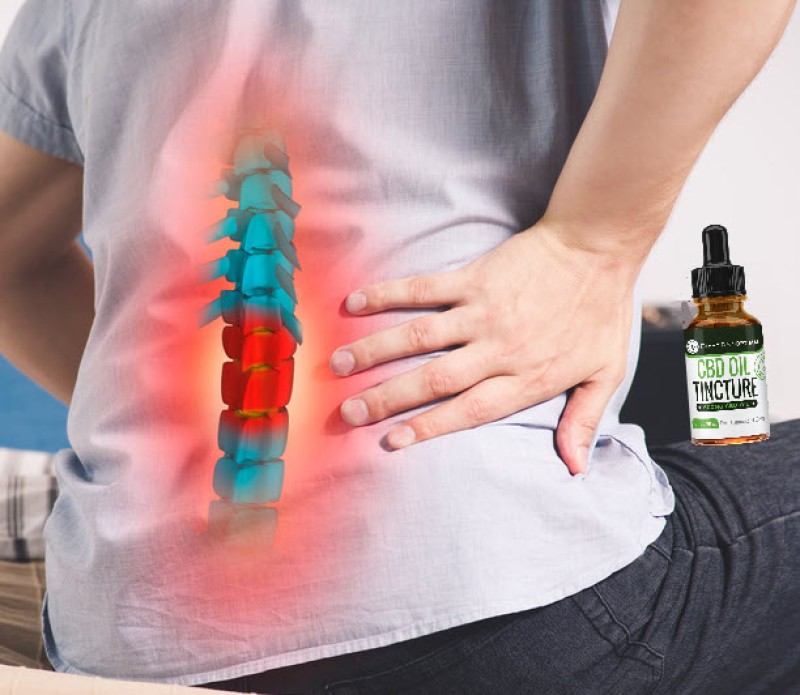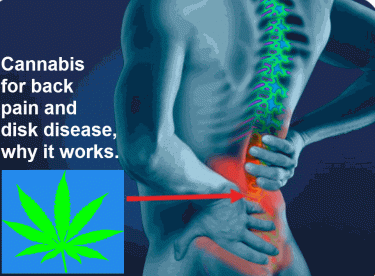
Numerous physiological and psychological variables are described by degenerative disc disease. The general phrase covers a variety of spinal disorders, including facet joint syndrome and stenosis. Early studies suggest that CBD may one day be used to treat the condition's physical harm and psychological stress.
The most common cause of chronic pain and disability worldwide is back pain. Degenerative disc disease(DDD) is just one of the many musculoskeletal and neurological system disorders that can cause back pain. The World Health Organization claims that these ailments affect a person's health, quality of life, and even capacity for work.
DDD is a classification of spinal disorders rather than a single diagnosis that involves the degeneration of intervertebral discs. These crucial components can be found in the cervical (upper), thoracic (middle), and lumbar regions of the human spine (lower). 23 discs separate the spine's moveable vertebrae.
HOW CBD FITS IN WITH DEGENERATIVE DISC DISEASE
Although there are numerous treatment options for back pain, only a few of them have been verified by science or deliver reliable outcomes. How does cannabis measure up as a potential treatment for back pain, given that the hunt for a cure is still very much ongoing?
Cannabis has been utilized by humans for thousands of years in an effort to treat a wide range of mental and physical conditions. This intriguing herb's resinous blossoms are packed with a potent mixture of phytochemicals, including 200 terpenes and more than 100 cannabinoids. Cannabidiol, sometimes known as CBD, is one of them and is one of the most well-known.
Although the research is still in its early stages, CBD has already shown promise in a number of clinical contexts. What do we now know about CBD's effect on DDD as cannabis science develops?
HOW DOES CBD HELP DEGENERATIVE DISC DISEASE?
Even though exposing the body to increasing loads and encouraging healthy mobility are vital for treating back pain, new therapies like CBD also seem to have a place in potential future treatments. Such as:
-
Capability to Lessen Injury to Intervertebral Discs
There was not a lot of research on CBD and DDD before 2014. This changed when a group of Brazilian researchers from the University of So Paulo set out to look at how CBD affected disc degeneration. They first developed a mouse model of DDD and then gave an experimental group various amounts of CBD.
Two and fifteen days after administering CBD, the effects were monitored by the researchers using MRI. After getting photos, they used histological analysis to examine the damaged areas at the cellular level. They discovered that CBD greatly lessened the harm done to the intervertebral discs. Within the annulus fibrosus, the cannabinoid's effects were very striking. The nucleus pulposus saw less dramatic alterations, though.
-
CBD Interacts With the ECS and Increases Anandamide Levels
But how can CBD actually bring about these beneficial adjustments? Well, the chemical affects several bodily systems to bring about physiologic changes. For instance, the endocannabinoid system and CBD interact (ECS). The CB1 and CB2 receptors, which make up the ECS, are present in high concentrations in the neurological and immunological systems, respectively, as well as in other parts of the body.
Although research has not yet identified them in the intervertebral discs, CBD may prevent disc degeneration by interacting with these receptors. The endocannabinoid anandamide is likewise kept from degrading by CBD, which prolongs its half-life in the body. This endocannabinoid, commonly referred to as the "bliss molecule," exhibits analgesic and anti-inflammatory properties that could aid disc repair.
-
Possibility of Reducing Inflammation
Cannabis researchers are examining CBD to see if it has any anti-inflammatory properties because degenerative disc disease causes a flood of inflammatory chemicals to be released. In a 2014 study published in PLOS One, researchers sought to determine whether cannabinoids in rats could prevent intervertebral disc degeneration.
In spite of their diligent efforts, the research team recommended additional studies into how CBD interacts with cell signals. In order to understand how cannabis affects those with the illness, clinical trials are also necessary.
-
CBD used for Mental Side Effects of Degenerative Disc Disease
Back pain must be treated with a multifaceted strategy. Although manual therapy, strength training, and specialty exercises are important, patients' psychological states have a significant impact on how they perceive pain and how well they are able to manage the disease.
Chronic pain and the psychological effects of DDD can cause unpleasant mental states such as depression, anxiety, and catastrophizing. Cannabidiol may help with the psychological symptoms of DDD, in addition to maybe addressing the physical parts of the disorder.
The early study on CBD and mental health is promising. Our brain's response to this important neurotransmitter may change as a result of the cannabinoid's interaction with the serotonin system. This could then have a significant effect on our mental health. Additionally, as previously mentioned, CBD prolongs the time that anandamide—a chemical linked to improved mood—remains in the synaptic region.
Additionally, research suggests that CBD may lessen the effects of stress. It's interesting to think that too much stress can alter how we experience and manage pain. A cycle of suffering may be created because the psychological state seems to both contribute to and originate from factors that cause chronic pain. By reducing some stress-related symptoms, CBD may change how people experience and perceive pain.
HOW IS CBD USED TO TREAT DEGENERATIVE DISC DISEASE?
Simply told, there isn't a simple solution to this problem. The investigation of how CBD affects DDD is still in its very early stages. Nobody is aware of the ideal dose or strategy for using CBD for the ailment because there hasn't been any clinical research to act as a basis.
CBD treatment for DDD symptoms is still an unproven strategy. But some people discover that cannabidiol aids them in some way. Of course, make sure to check with your doctor first.
BOTTOM LINE
Although it is still much too early in the research to draw any firm conclusions, cannabis exhibits significant potential when used in conjunction with exercise and psychological treatment as part of a comprehensive strategy. Hopefully, further research will show how CBD affects the condition physiologically, as well as the dosage and route of administration.







